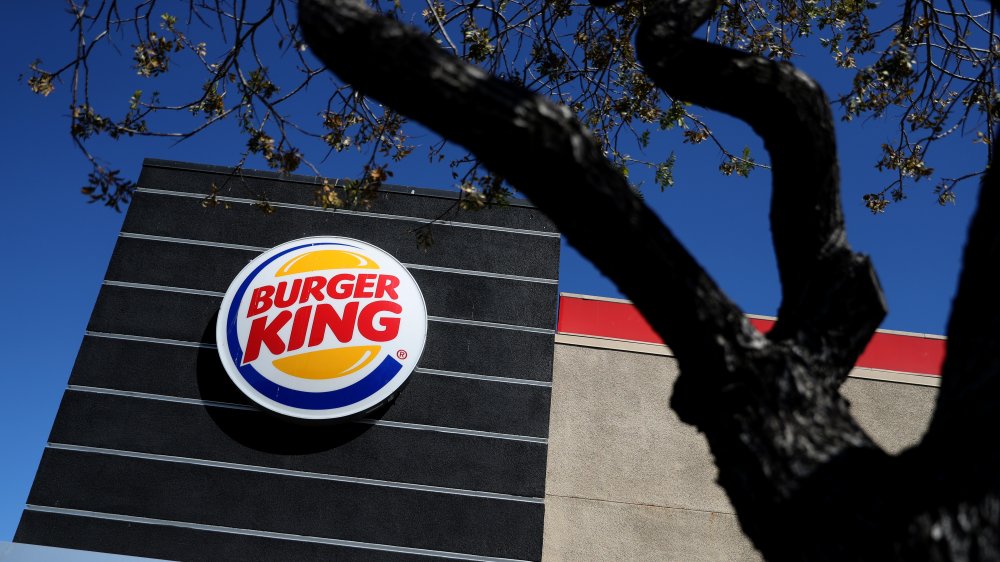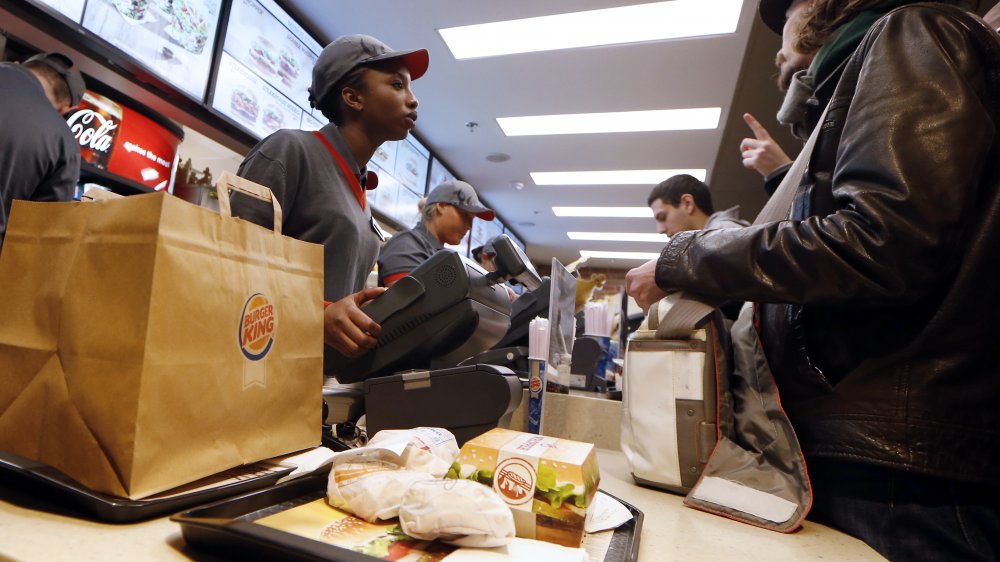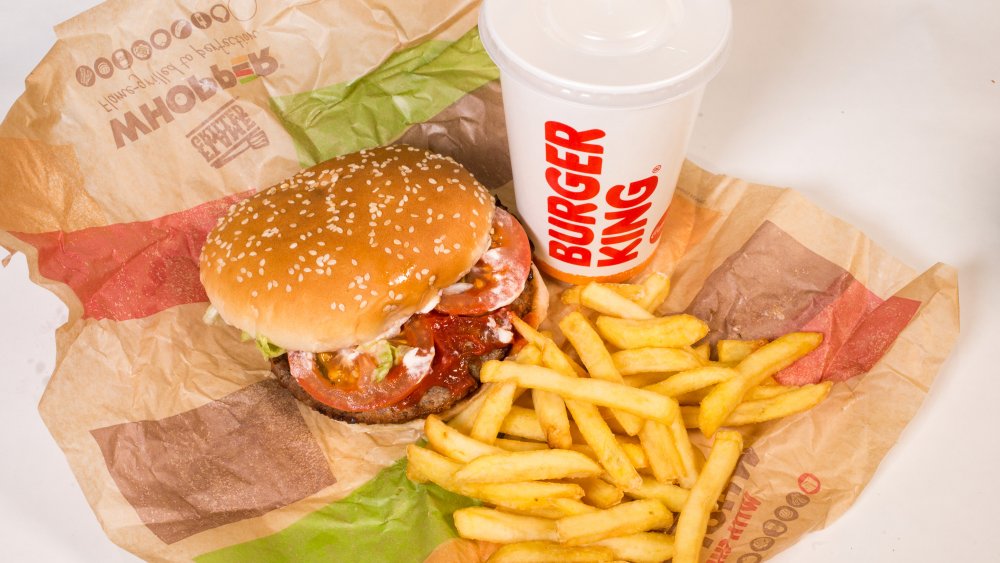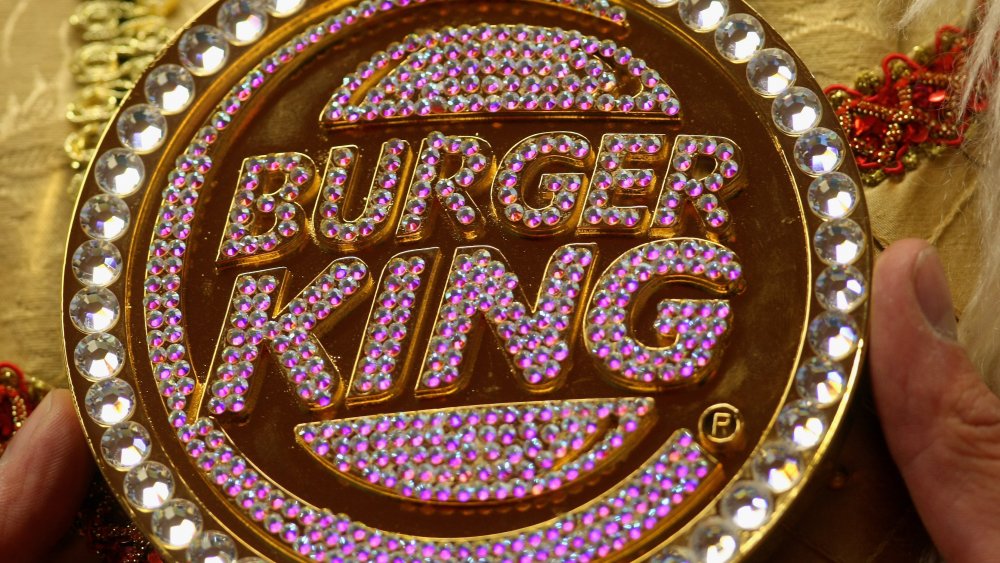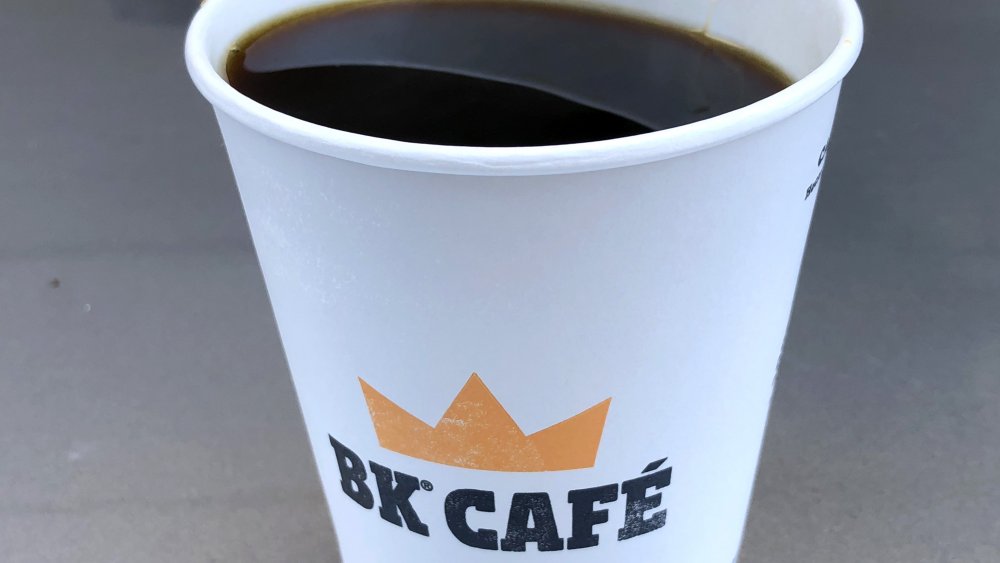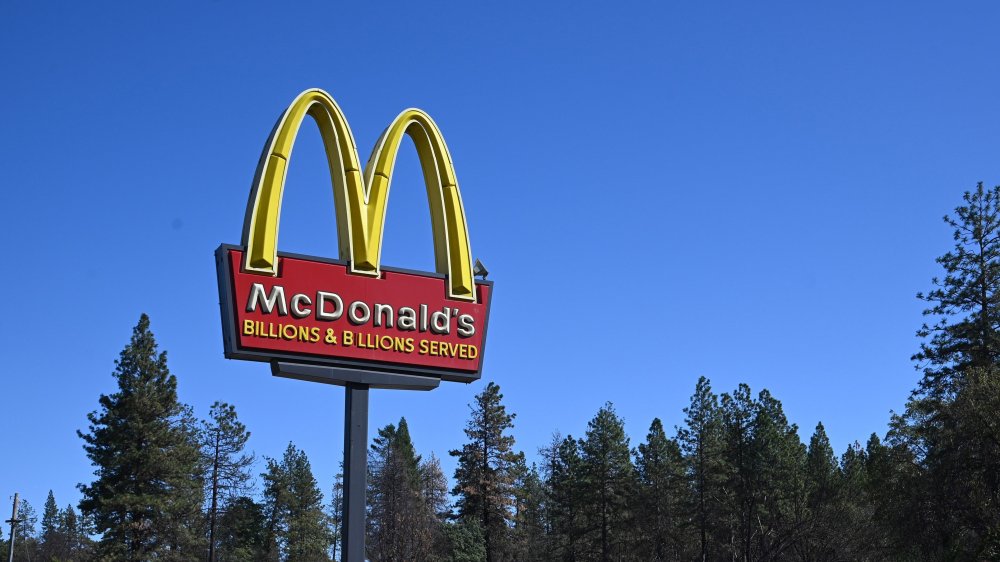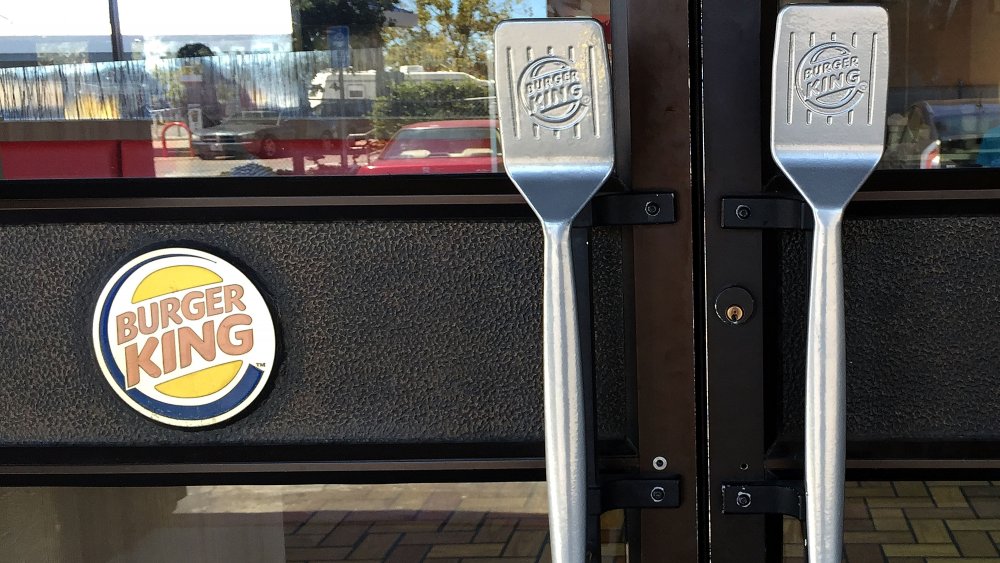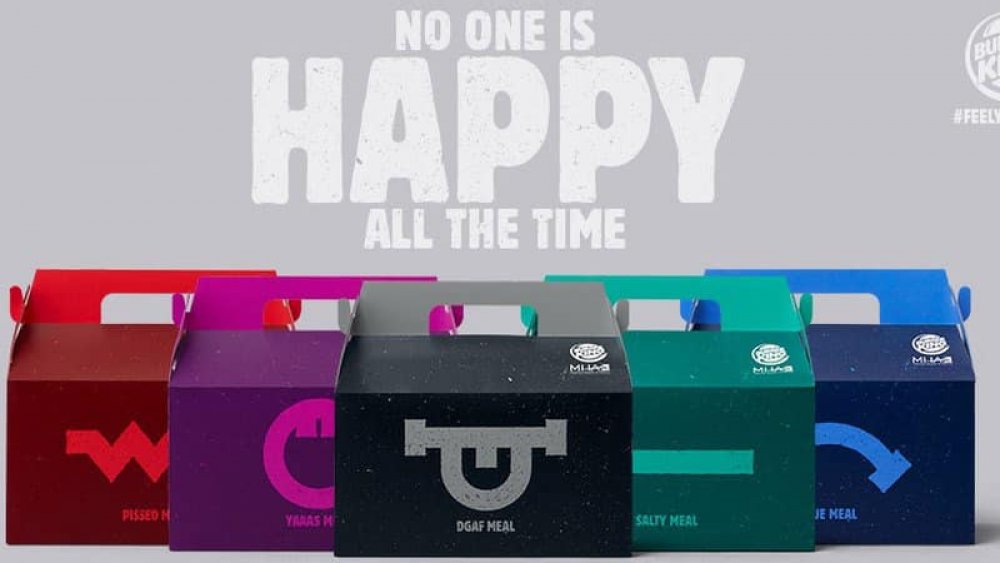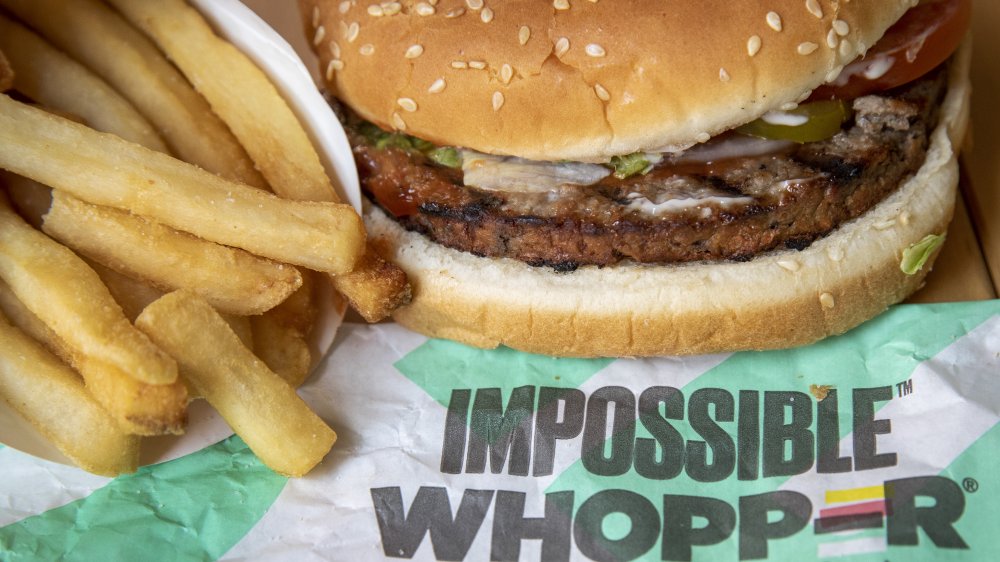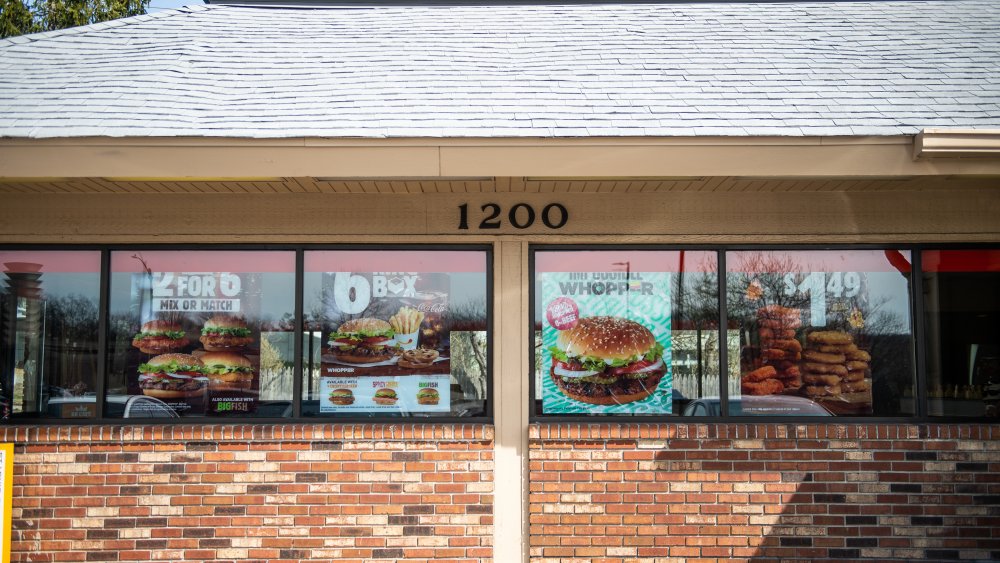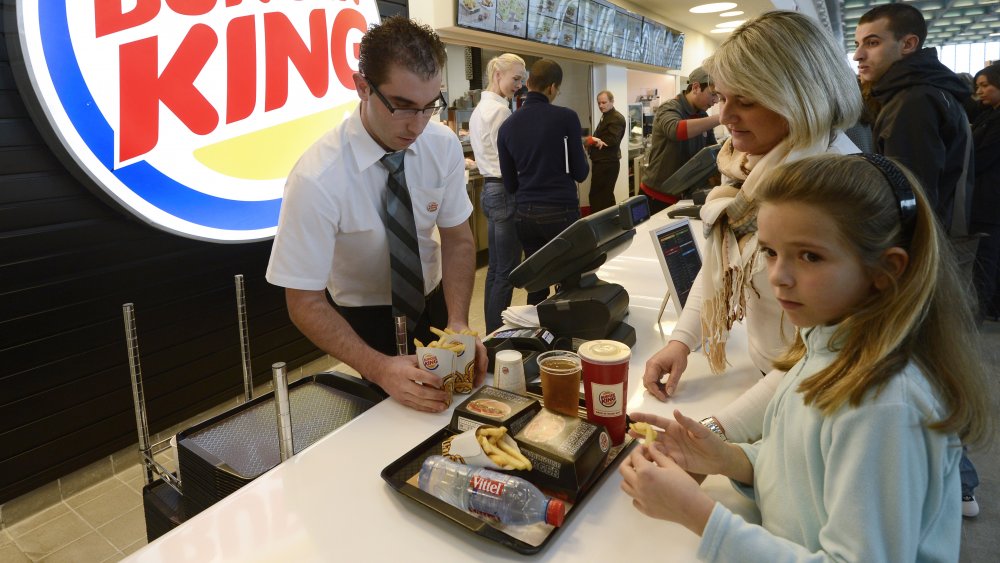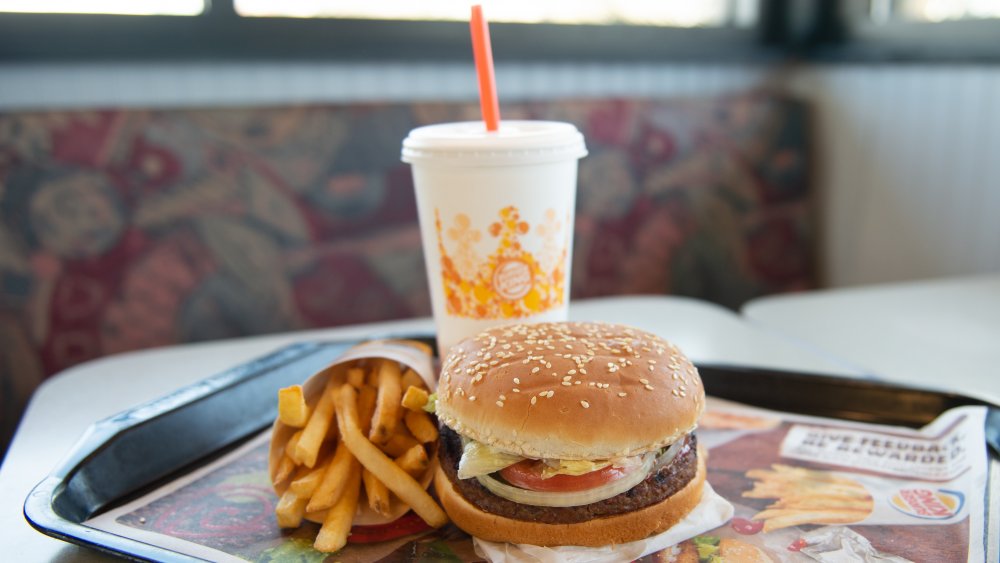The Real Reason Burger King Is Struggling
Restaurants come and go — frequently. According to CNBC, closure rates (which can vary greatly) average around 60 percent for new restaurants who haven't yet seen their first anniversary. That gets even higher when you look at restaurants that have been open for less than five years — in those cases, it's about 80 percent. Those aren't great odds.
And that's what makes the big chains even more impressive — they may have started out as little mom-and-pop shops, but they beat the odds and became juggernauts with logos recognized around the world. Take Burger King, for example. That was started by Keith Kramer and Michael Burns in 1953, and they called it Insta-Burger King. The first franchise, says The Balance Small Business, came just the next year. And from there? Well, everyone knows Burger King and their creepy king mascot today. They have thousands of locations all over the globe, and they're the very definition of a fast food empire.
They might seem untouchable, up there on high with the likes of McDonald's and... well, that's about it, really. But the truth is, they're not — they're faced with the need to constantly grow and change just like the rest of the market. They need to keep up with changing trends, but in recent years, it hasn't been all smooth sailing and clear skies for the King. Why? It's complicated.
Here's what's happening to Burger King
In May 2019, Burger King announced something a bit strange: they wanted to close the numbers gap between themselves and McDonald's even more, so they were... closing stores?
Yes, says Restaurant Business, and it's an interesting tactical move on their part. At the time of the announcement, they had around U.S. 7,300 locations (compared to the 13,900-ish U.S. locations McDonald's boasted). In order to get closer to McDonald's numbers, they were going to start by closing between 200 and 250 locations. That was a huge jump in closures, as Burger King typically averaged about a 100 to 130-store closure rate every year in the lead-up to this pretty big announcement.
So, what gives? First, they're not all going to happen at once, and Burger King says the closures will, for the most part, happen on a rolling basis as it comes time for franchisee contracts to be renewed... or terminated. On average, stores that are slated for closure make around $1 million a year in sales. Not too shabby, but considering newer and more profitable restaurants average about $1.5 million, that puts things in perspective a bit, doesn't it?
President of Burger King in the Americas, Chris Finazzo, put it this way: "Closing low-volume restaurants creates a virtual cycle of improved profitability." In spite of the closures, Finazzo has also said that he believes there's more than enough room to open still more locations, but there are other things that need to happen, too.
Burger King has been slow to update their image
In late 2018, Burger King started talking about their brand new, futuristic design plans. They were calling it the "Burger King of Tomorrow", says QSR Magazine, and they were doing it in response to slowing sales.
Plans for Burger King locations included things like overhauling drive-thrus to give restaurants two lanes, and they were also looking at adding outdoor, digital menu boards, and integration with mobile apps. They were also going to be adding self-service kiosks, and if that all sounds familiar, it should — it's what McDonald's has, for the most part, already done in what Restaurant Dive notes is a similarly-named campaign: "Experience of the Future."
At the time they made the announcement, they had no timeline in place for exactly when existing stores were going to get their facelifts, but it's no small investment. It's also one that falls heavily on the shoulders of franchisees, although Burger King has said they're going to be helping franchisees out and offering royalties to those who complete upgrades ahead of schedule. Still, it's undeniable that they're still a step behind McDonald's, and that's not good for business... or their image. Technology moves fast, and businesses are expected to keep up with the times. If they don't, customers will simply go elsewhere.
Burger King has gotten stuck in gimmicks
When CNN took a look at just why Burger King had fallen behind some of their biggest competitors, part of the reason, they said, was that they were focusing on the wrong thing. Instead of focusing on, say, adding new menu items that will get people coming back regularly, Burger King went a different route: the gimmick.
What do they mean? Take 2018's Halloween stunt, when they released their creepy-looking "Nightmare King," for example. The limited-time burger contained — the ad campaign claimed — a particular combination of proteins and ingredients that would interfere with sleep patterns and cause nightmares. The actual science was a little questionable, but here's the thing — while it undoubtedly got people in the door wanting to give the Nightmare King a try, it wasn't something that kept people coming back. They stopped in, they got their weird green burger, and then they went about their usual routine when the promotion ended.
Momentum slowed, sales declined again, and it didn't work nearly as well as, say, creating a new type of Whopper that would become a popular menu staple. Gimmicks are great, but the novelty wears off. Bling is short-term, and what Burger King needs is long-term, devoted customers who love their products and can't get them anywhere else.
Burger King hasn't made breakfast count
When is the last time you went to Burger King for breakfast? It's probably been a while, right? Sure, the Croissan'wich is great but the coffee could be better, and it's not good enough to keep you coming back, is it? And that's a big problem for Burger King.
About the same time Burger King announced they were going to close some of their lowest-performing stores, they also announced they were going to find new ways to try to win over a solid breakfast crowd. Breakfast, says Restaurant Business, is a huge weak spot in Burger King's business plan. When you look at just breakfast numbers, an average Burger King only makes about half as much as an average McDonald's. And that's not good for Burger King. When an entire meal accounts for just 15 percent of sales figures, there's something missing.
Aside from the obvious — customers — Burger King says they're also missing out on creating a reason for people to make them a part of their morning routine. They needed to improve their coffee game, for starters, and they just need to get the word out about those Croissan'wiches if they want to get anywhere near McDonald's and their Egg McMuffins. Wooing a crowd away from their go-to breakfast will be hard, but they're going to give it a shot.
Burger King's struggles come from one word: McDonald's
In all fairness, Burger King has something of an uphill battle to fight. Their biggest competitor is one of the biggest, most widely recognized brands globally, and Design Hill says that even their logo is one of the most easily recognized in the world. Even for a company as big as Burger King, having a rival as big as McDonald's presents some challenges.
Burger King announced their massive redesign plan — without a timeline for implementation — just a few months after McDonald's announced they were dumping a shocking $6 billion into modernizing their U.S. restaurants. That was in 2018, and they had a timeline — it was going to be rolled out by 2020.
And according to CNN, that kind of competition is a huge deal. It's not just a matter of getting customers in the door, it's a matter of getting franchisees on board. While smaller companies — like Burger King — can struggle with getting franchisees to agree to make investments, changes, and upgrades, McDonald's has a track record of results that inspires a loyalty that gets things done. Meanwhile, Burger King is left to bring up the rear.
You just haven't seen Burger King's growth
According to QSR Magazine, looking at US-based Burger King restaurants only paints a small part of the picture. At the same time same-stores sales were falling, numbers were up globally.
And that's something that's easy to overlook, because we usually only hear about the things going on in our own backyard. At the same time they announced they were going to be closing under-performing stores, Burger King's parent company, Restaurant Brands International, also said they were planning on hitting the 40,000-location mark before 2029. (RBI also owns Popeyes and Tim Hortons.) That would mean opening a whopping 14,000 more locations across all their brands, and here's the surprising thing — there are a shocking number of international Burger King restaurants that are pulling the brand up by its bootstraps.
At the time of the announcement, there were 7,617 Burger King stores in North America. Compare that to Latin America, Asia Pacific, Europe, the Middle East, and Africa — combined, they had 10,179 locations. Business was booming, and a closer look at the Latin America numbers show they're only trailing their closest competitor by a few hundred locations. The lesson here is that Burger King might seem like it's struggling in the U.S., but globally, they're doing just fine.
There was a major backlash against a recent Burger Kingproduct
In early 2019, Burger King made a risky move: taking on McDonald's Happy Meals. That's not risky in itself, but the way they did it was. Their "Real Meals" included things like the Blue Meal and the DGAF Meal. It was in part designed to be a shot at McDonald's and, in part, it was designed in partnership with Mental Health America, in honor of Mental Health Awareness Month.
It wasn't long before CNBC was reporting that they'd made a lot of people very upset for a number of reasons. Some were accusing them of using mental illness to take a swing at a competitor and to turn a profit, while others were pointing out that moods were not the same thing as mental illness.
Even as some lauded Burger King's efforts to start a conversation around mental illness, others condemned them for not going far enough — like not offering resources for those who are living with mental illness, and making it a one-off gimmick instead of a legitimate, long-running cause.
Professor of digital media and marketing at Carnegie Mellon's Heinz College put it this way: "If the general public finds out that your actions don't coincide with your messaging, then that can be potentially very damaging for a company."
Burger King missed their target audience with the Impossible Whopper
For many people, the announcement that Burger King was going to be partnering with Impossible Foods to develop the plant-based Impossible Whopper was super exciting. Finally, a vegetarian and vegan option for fast food lunches on the go! It was, at a glance, a total win, but there was a massive catch that Inc. said wasn't just a catch, it was a huge mistake that alienated a lot of people.
When Burger King announced their vegetarian burger, it seemed like they had not only achieved the unthinkable, but that they'd beat McDonald's to it. Until, that is, they admitted that the plant-based Impossible Whoppers were going to be cooked on the same equipment used for beef and chicken.
That was a huge bummer, and it meant the meat-free burger wasn't actually vegetarian or vegan after all. (There's also the problem of egg-based mayo being featured on the burgers and that's not vegan at all, but at least you can ask for that to be left off.)
It's impossible to describe how big of a swing-and-a-miss this was for Burger King. Look at it this way: what's worse than just not acknowledging a customer base that might want options for a vegetarian meal? Acknowledging it, getting people excited, then getting it terribly wrong in a way that could potentially come off as just insulting. Oops.
Burger King's ad campaigns have alienated a lot of people
Ad campaigns are supposed to make you want to buy a product, not feel icky by association. But Burger King has had a number of ad campaigns that are definitely more of the latter.
In 2009, there was that ad for the BK Super Seven Incher that, let's be honest, you know just by that name how they marketed it. Throw in a staring woman with her mouth wide open, the caption "It'll blow your mind away," and it wasn't so much subtle as it was cringey. Jezebel called it "gross," and the model — who hadn't consented to being in the ad — condemned it as the image of sexual assault (via The Telegraph). That ad was released in Singapore, but very quickly went viral.
The Russian branch of Burger King has made some spectacular blunders, too. In 2018, Russia's Burger King promised free food for life and a cash prize to any woman who took advantage of the World Cup — and international soccer players — in order to get pregnant with their babies (via PR Daily).
Have they learned? Nah. In 2019, CNN reported Burger King in New Zealand was backpedaling hard after it was pointed out that using photos of people eating burgers with chopsticks was a bad way to advertise their Vietnamese Sweet Chili Tendercrisp sandwich. Yikes.
Burger King has seen a drop in millennial traffic
Millennials get blamed for a lot, but they are the future — and they are shaping the way companies do business. According to Forbes, that was definitely true of the fast food landscape, and as far back as 2014, Burger King was finding they just weren't appealing to the millennial generation.
Here's an interesting (and telling) statistic: from 2007 to 2014, Burger King saw a four percent increase in their traffic. That's great! What's not great is that during the same period, they saw a five percent drop in traffic in the category of low-income millennials. When it came to high-income millennials, the change was even more drastic — that was a 16 percent drop.
Burger King isn't the only chain struggling to try to find a way to woo millennials and get them back through the door (or drive-thru), but millennials' lack of interest in the same kind of dining options that got previous generations super excited is definitely something Burger King needs to consider.
It's not all bad news for Burger King fans
Don't fret, Burger King fans — it's not all bad news. Not only are there plans to open new stores in place of the ones they're closing, but according to Forbes, one person has gone a long way in injecting new life into the decades-old brand, and his name is Daniel Schwartz.
Scwartz was just 29 years old when he became Burger King's CFO, and 32 years old when he was named a chief executive in charge of essentially making Burger King cool again, and that's turned out to be pretty important for the chain. Forbes says he's done everything right. From streamlining food prep to trimming payroll, selling off corporate jets, encouraging employees to make free business calls via Skype, and handing company stores over to the control of franchisees, Schwartz is credited with doing something even McDonald's couldn't top — in 2018, their revenue jumped 17 percent. Stock skyrocketed, and around 100 of Burger King's parent company managers — who were rewarded with incentives should they decide to invest in their company — became millionaires.
So, it's not all doom and gloom for Burger King. They may be closing stores — one might even be in your neighborhood — and they may be facing their struggles, but don't count them out. Not by a long shot.
